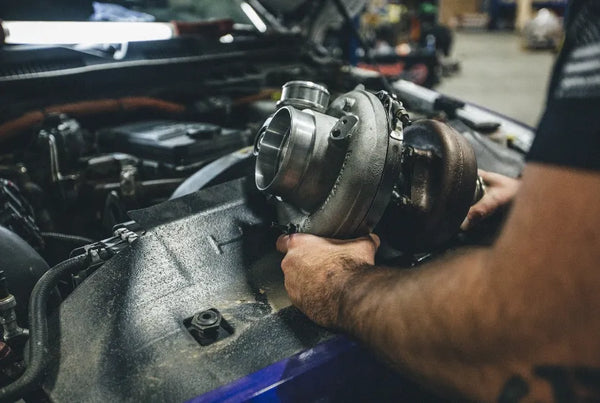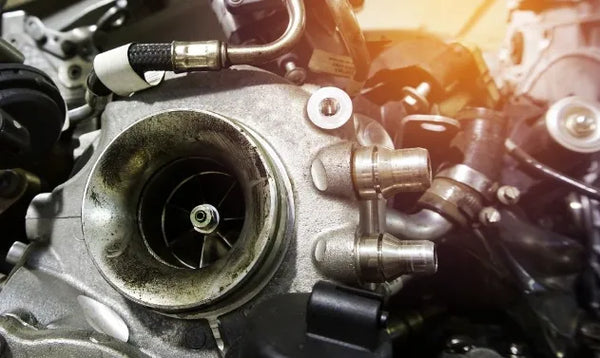What Causes Your Turbocharger Failure?
TURBO FAILURE SYMPTOMS

-
POWER LOSS
If you notice that your car isn't accelerating as powerfully as it used to, or is slow to react to your input, this might be a sign that your turbo is failing.
Similarly, a turbocharged car that struggles to maintain high speeds or isn't able to reach speeds it once could be experiencing turbo failure.
-
WHINING ENGINE
One of the unexpected advantages of a turbocharger is that it actually makes the engine quieter because it muffles the sound of air intake.
However, if you start to hear a loud, whining noise - a bit like a dentist's drill or police siren - it's a potential symptom of turbo failure.
As the fault gets more serious, the noise will get worse. If you notice whining from your engine, you should get a professional mechanic to have a look at your car.
-
EXHAUST SMOKE
When oil leaks into the exhaust system, it produces distinctive blue/grey smoke as it burns off. This could be caused by a crack in the turbo housing or damaged internal seals.
If this symptom is caused by the turbocharger, you're more likely to see these discolored fumes as the engine revs increase shortly after idling.
-
CHECK ENGINE LIGHT
The computer diagnostics on most modern cars are able to pick up turbo faults and the check engine light will appear on the dashboard to notify the driver.
However, the check engine light doesn't solely indicate turbo failure - you will need a professional mechanic to perform further checks to diagnose the exact nature of the engine problem.
WHAT CAUSES TURBO FAILURE?

-
OIL/LUBRICATION
Engine oil is essentially the lifeblood of your car. It works to lubricate key moving parts, protect them from corrosion and keep them cool while in use.
In terms of the turbocharger, it needs a constant flow of clean, quality oil. A lack of oil (oil starvation), incorrect grade of oil, or poor quality oil will lead to a build-up of contaminants in the engine (oil contamination). This can cause abrasive damage to the inside of the turbo.
It's important that the engine oil and oil filter are both replaced at the manufacturer's recommended intervals.
-
DAMAGED SEALS
If the seals between the compressor and the engine become worn or cracked, the oil will leak into the exhaust system. As a result, the turbo has to work harder to increase air pressure.
This problem is also known as over-speeding. Ultimately, it will reduce the efficiency and the boost delivered by the turbo.
-
FOREIGN OBJECTS/DEPOSITS
A turbocharger is essentially made of two fundamental components: the compressor at the front and the turbine at the back. Sometimes, foreign objects such as dust particles, dirt, leaves, and small stones can enter the turbo, either via the compressor inlet or turbine inlet.
If a foreign object enters the compressor housing, it often comes from the air filter. In contrast, if the foreign object causes damage to the turbine, the problem usually originates from the engine itself.
The efficiency of the turbo will be reduced if foreign objects start to damage the compressor wheels or turbine blades. To prevent this from happening, your air filter should be serviced and replaced regularly. You should also check your turbo for debris.
-
WEAR & TEAR
Turbos are designed to last the lifetime of the vehicle (or around 150,000 miles); however, it's possible for them to wear out over time depending on how hard you drive the car and the original build quality of the turbo.
CAN I DRIVE WITH A BLOWN TURBO?
Yes, you'll still be able to drive your car if your turbocharger fails; however, engine failure won't be far behind, so only drive on if you have to.
As soon as you spot any of the turbo failure symptoms outlined above, you should get your turbo checked as soon as possible by a qualified technician. The longer you leave it, the worse (and more expensive) the problem will get.
Conclusion
If you're aware of Turbocharger problems with your automobile or have questions about engine replacement components, hpinjection.com has the answers you're looking for – and the products, too!
Here is the link you can check and buy aftermarket Turbocharger online catalog.


